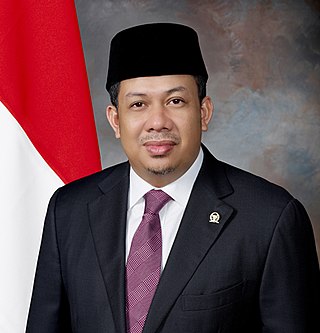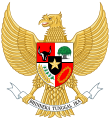Legislative elections were held in on 5 April 2004 for both houses of the People's Consultative Assembly of Indonesia. This included all 550 seats in the People's Representative Council and 128 seats of the newly-formed Regional Representative Council.

The Democratic Party is a constitutional populist political party in Indonesia. It was founded on 9 September 2001. It states its ideology to be based on Pancasila.
Law of Indonesia is based on a civil law system, intermixed with local customary law and Dutch law. Before the Dutch presence and colonization began in the sixteenth century, indigenous kingdoms ruled the archipelago independently with their own custom laws, known as adat. Foreign influences from India, China and the Middle East have not only affected culture, but also the customary adat laws. The people of Aceh in Sumatra, for instance, observe their own sharia law, while ethnic groups like the Toraja in Sulawesi still follow their animistic customary law.

The president of the Republic of Indonesia is both the head of state and the head of government of the Republic of Indonesia. The president leads the executive branch of the Indonesian government and is the commander-in-chief of the Indonesian National Armed Forces. Since 2004, the president and vice president are directly elected to a five-year term, once renewable, allowing for a maximum of 10 years in office.

Legislative elections were held in Indonesia on 9 April 2009 for 132 seats of the Regional Representative Council (DPD) and 560 seats of the People's Representative Council (DPR). A total of 38 parties met the requirements to be allowed to participate in the national elections, with a further six contesting in Aceh only. The Democratic Party of President Susilo Bambang Yudhoyono won the largest share of the vote, followed by the Golkar Party and the Indonesian Democratic Party – Struggle.
Legislative elections were held in Indonesia on 9 April 2014 to elect 136 members of the Regional Representative Council (DPD), 560 members of the People's Representative Council (DPR) and members of regional assemblies at the provincial and regency/municipality level. For eligible voters residing outside Indonesia, elections were held on 5 or 6 April 2014 based on the decision of the electoral commission of each different countries.

General elections were held in Indonesia on 17 April 2019. For the first time in the country's history, the president, the vice president, members of the People's Consultative Assembly (MPR), and members of local legislative bodies were elected on the same day with over 190 million eligible voters. Sixteen parties participated in the elections nationally, including four new parties.

The Nanggroe Aceh Party is a regional political party in Indonesia. It was established as National Aceh Party, as a result of a split within the Aceh Party triggered by disagreements over the candidate for governor in the 2012 Aceh gubernatorial election. It was founded by Irwandi Yusuf, who was Aceh's governor between 2007 and 2012. The party qualified to contest the 2014 elections in Aceh, and won 4.7 percent of the vote, winning three seats in the provincial legislature.

Fahri Hamzah is an Indonesian politician and former deputy speaker of the Indonesia House of Representatives. He first became a member of the legislative body in 2004 and has been re-elected twice in the same election district.

Local elections were held in Indonesia on 15 February 2017, with a single run-off for Jakarta on 19 April 2017. The series of elections was the second time local elections were held simultaneously across the country after the 2015 local elections. In total, the election contested 7 gubernatorial, 18 mayoral and 76 regent seats with 41 million eligible voters and 337 candidate pairs.
General elections are scheduled to be held in Indonesia on 14 February 2024 to elect the President, Vice President, People's Consultative Assembly (MPR) which consists of the DPR and the DPD, and members of local legislative bodies. The newly elected members of the MPR will be sworn in on 1 October 2024, while the elected President and Vice President will be sworn in on 20 October 2024. Incumbent President Joko Widodo is ineligible to run for a third term due to the term limits established by the Indonesian constitution.
In Indonesian law, the term "city" is generally defined as the second-level administrative subdivision of the Republic of Indonesia, an equivalent to regency. The difference between a city and a regency is that a city has non-agricultural economic activities and a dense urban population, while a regency comprises predominantly rural areas and is larger in area than a city. However, Indonesia historically had several classifications of cities.
The Job Creation Act, officially Law Number 11/2020 on Job Creation, is a bill that was passed on 5 October 2020 by Indonesia's People's Representative Council (DPR), with the aim of creating jobs and raising foreign and domestic investment by reducing regulatory requirements for business permits and land acquisition processes. Due to its length of 1,035 pages and its coverage of many non-employment sectors, it is also referred to in Indonesia as an omnibus bill. The final draft was changed to 812 pages due to pagination being changed to legal format. After being passed into law, there were various substantial text alterations and deletions, as well as procedural issues, which made its legal status eligible for being formally annulled.

Nusantara Capital City Authority is a cabinet level-agency formed by Indonesian government, working directly under the President of Indonesia. The agency will become a special agency tasked with managing and governing the city of Nusantara, future capital of Indonesia located on Kalimantan.
Law on State Capital is an omnibus law to relocate capital of Indonesia from Jakarta to Nusantara at East Kalimantan as new capital of Indonesia. The omnibus bill of the law was passed into law on 18 January 2022. and finally commenced on 15 February 2022.
The People's Consultative Assembly, the bicameral legislature of Indonesia, passed a series of resolutions of the People's Consultative Assembly or TAP MPR throughout the 1960s, to the very last issued in 2003.
The Law on Law Formulation or officially titled Law No. 13/2022 in regards of Second Amendment of Law No. 12/2011 on Law Formulation is a law that enables formulation of omnibus law in Indonesia.
The 2023 Omnibus Law on Job Creation is replacement of the Omnibus Law on Job Creation. The law is passed by the People's Representative Council on 21 March 2023. The law commenced on 31 March 2023.








